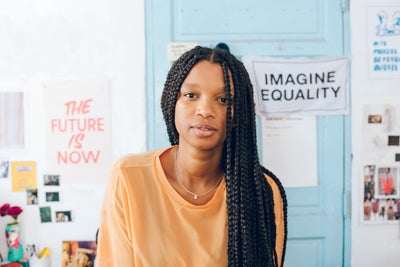Crowning Moments

Your hair is a source of beauty, of pride, of self-expression. But in most U.S.
states, that is overlooked—it is perfectly legal to discriminate against Black
men, women, and children because of their hair.
In a recent Dove study (2021 CROWN Research Study for Girls) , 53% of
Black mothers whose daughters have experienced hair discrimination say it
first started when they were as young as five.
Today we’re sharing stories of people who have endured this discrimination
and ways you can make a difference right now for you, your family, and
your community—because our hair should be celebrated, not censured.
Young People, Old Injustices
In Orlando, Florida, C.J. Stanley was excited for the first day at a private
school. But that excitement soon turned to confusion and fear when his
teachers would not allow him into the classroom—when he was banned
from attending school because of his dreadlocks. His father, Clinton,
recorded these moments on Facebook Live saying, “My son just got told
that he cannot attend the school with his hair. If that’s not biased, I don’t
know what is.” And he eventually enrolled C.J. in public school.
Faith Fennidy had worn her hair in thick braids with extensions to school in
Terrytown, Louisiana, for two years. But over the summer the school issued
a new policy prohibiting extensions, clip-ins, and weaves. So, when she
arrived for class, she was told her hairstyle was unacceptable. Her brother,
Steven Evergreen Fennidy said, “Extensions make the hair easier to
maintain, it’s just one more barrier to entry for black people.” Her family
explored other school options for Faith.
In 2018, a 16-year-old African American wrestler from New Jersey named
Andrew Johnson, was given an ultimatum by a white referee before a match. He was told his hair covering didn’t conform to the rule book, so he was asked to cut his dreadlocks or forfeit. Soon a viral video of a white female trainer cutting off Johnson’s hair transformed the teenager into a symbol of racial tension.
Kerion Washington, 17, was turned down from a summer job at Six Flags
Over Texas because his dreadlocks were considered an “extreme hairstyle.”
He told local new stations that he had been growing out his hair for the
three years and it now sits shoulder-length on his head. He went on to find
another summer job, but said, “I just don’t even believe it. “That I would
have to do that just to work there.”
These stories should not have to be shared, they should never have happened. Young people should be able to go to school, to work, and to enjoy their activities without fear. And that’s why we need the CROWN Act. It will ensure protection against discrimination based on race-based hairstyles by extending statutory protection to hair texture and protective styles (such as braids, locs, twists and knots) in the workplace and public schools.
How You Can Create Change Now
Let your voice be heard. Drive awareness about hair bias and discrimination
across your social media channels. Advocate to make hair discrimination
illegal in workplaces and schools at the state and federal level by signing
the petition and inspiring lawmakers to take action by writing to your state
legislator(s). Help to shift culture by changing perceptions, attitudes,
behavior, and accountability related to hair and hair discrimination.
Help Dove pass the Federal CROWN Act bill by spreading the word and signing the petition at Dove.com/CROWN.
Source: Read Full Article
